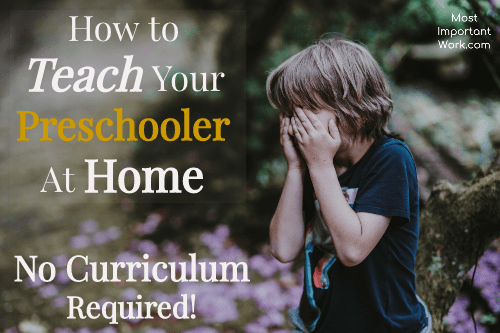
What is the Most Important Work?
Reading Time: 2 min 26 sec
Welcome to the Most Important Work blog. I am excited to kick off what I hope is a very fruitful friendship.
I started Most Important Work because after spending twelve years as a children’s and youth pastor and becoming a parent myself, I realized that:
-
Parenting is HARD work
2. Every parent is afraid they are going to blow it
3. We all wonder if we are doing enough

I found after talking to numerous parents that we are all so busy trying to keep our children clothed, fed, and ALIVE that we struggle to find a consistent time to incorporate God in everyday life. If we do find the time, we are at a loss of how to (besides reading the Bible, prayer and memorizing scripture) weave the things of God throughout our day.
I was also tired of children’s curriculum that was so focused on transferring facts about Jesus that they missed the whole “heart” part of a relationship with Jesus.
I believe Catherine Stonehouse and Scottie May say it best in their book, Listening to Children on the Spiritual Journey,
“Often adults have assumed that we could give children their understanding of God by just telling them what God is like… As they are ready, children construct or form their understandings for themselves, with the gracious presence, encouragement, and guidance of God’s Spirit.”
We can’t just fill our children’s heads with facts about God and assume our kids will grow up having a thriving relationship with Jesus.
It is our charge as parents to pass on our active faith to our kids. Meaning, our children come to experience a deeper relationship with God through the power of the Holy Spirit AND by watching US live life.
Stonehouse and May continue by saying, “The lives we (parents) live, how we love and discipline children, the stories we tell, the comments we make, and the lessons we teach are raw materials for God and the children to use as they actively construct their understanding of God and God’s ways.” I want to give my children the best of both worlds; a balance of both experience and knowledge of God.
What would it look like, for your child to “know” from their own experience (not just hearing it from you) that they are uniquely and lavishly loved by God?
That the Creator of the universe wants to be an important part of all the ordinary things that make up your child’s day? If that was at the core of who they were; how would that change how they saw and moved in life? Their very identity?
It would change the trajectory of
your child’s life.
It would chIt ItIt the trajectory of your child’s life.
I have been on a quest, pouring through books, praying, leading simple activities at home and at church, brainstorming, and talking with parents all on a mission to find ways that real parents, with real lives, can intentionally provide simple ways for their children to meet with Jesus at home.
My desire is that Most Important Work would act as a catalyst; providing encouragement, inspiration, resources, and motivation for Moms as we travel together on this parenting journey.
If you want to know how to get started in living a deep life with God; grab our Deeper Life Beginners Guide (below). And join our community of moms who are hungry for more Jesus in their lives and in the lives of their families.



